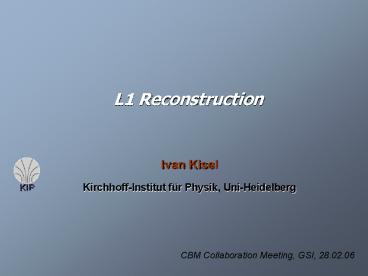L1 Reconstruction - PowerPoint PPT Presentation
1 / 12
Title:
L1 Reconstruction
Description:
Move detector inefficiency problem outside of the combinatorial part ... Inefficiency of a single plane does not kill the space point, but equivalent to ... – PowerPoint PPT presentation
Number of Views:45
Avg rating:3.0/5.0
Title: L1 Reconstruction
1
L1 Reconstruction
- Ivan Kisel
- Kirchhoff-Institut für Physik, Uni-Heidelberg
KIP
CBM Collaboration Meeting, GSI, 28.02.06
2
Outline
- CA track finding in STS and detector geometry
- CA track finding in TRD
- KF for track fit
- KF for primary and secondary vertex fit
- EN for RICH ring finding
3
Event Processing Steps (HLT)
STS Data
RICH Data
TRD Data
CA Track Finder
EN Ring Finder
CA Track Finder
KF Track Fit
KF Track Fit
Track Merger
PV Finder
KF Track Fit
PV GeoFit
SV GeoFit
SV ConstrFit
Performance
Select/Discard Event
4
PC Sub-Farm
Scheduler
Input Data
Farm Control System
Sub-Farm
Sub-Farm
Sub-Farm
-Farm
HWP/AB
HWP/AB
HWP/AB
HWP/AB
HWP/AB
HWP/AB
HWP/AB
HWP/AB
HWP/AB
HWP/AB
HWP/AB
HWP/AB
Pnet
Pnet
Pnet
SWP
SWP
SWP
SWP
SWP
SWP
SWP
SWP
SWP
SWP
SWP
SWP
SWP
SWP
SWP
SWP
SWP
5
Detector design I two strip planes per stations
100 det. eff. track found
95 det. eff. track found
95 det. eff. track not found
95 det. eff. track found
1
9
6
8
3
4
5
7
2
- Double sided STS stations or two single sided
detectors per station - Need minimum 4 consecutive hits per track to be
found - Slow combinatorial track finding and fast track
selection - Move detector inefficiency problem outside of the
combinatorial part - Need extra 2 stations in total 9 stations
- The same is valid for MAPS and hybrids
6
Detector design II three strip planes per station
xy
xyu
N3D points NMC points 5NMC points
6NMC points
N3D points 0.9NMC points 50.1NMC points
1.4NMC points
- Inefficient strip detector with three sensitive
planes gives only about 50 more fake hits - Much easier and faster combinatorics
- Inefficiency of a single plane does not kill the
space point, but equivalent to the double sided
detectors case - Modified strip hit producer
- Need more planes, but not extra stations
- Double sided strip detectors give about 5 times
more fake hits - Large and slow combinatorics due to fake hits
- Inefficiency of a single plane kills the space
point - Need more stations
7
Detector design III four strip planes per station
xyuv
Frontal view
Side view
Hybrid detector
xy uv
Target
N3D points NMC points
- Gives tracklets within station
- Combinatorics is lower as in hybrid detector
- More complicated strip hit producer becomes a
part of track finding - Single track cuts can be possible already at the
level of tracklets
- Space point reconstruction is reliable with
respect to inefficiency of a single plane - Combinatorics is almost as in the hybrid detector
( local space point creation)
8
Detector design IV unified STS-TRD track finding
TRD
STS
STS
TRD
x y x y (uv?)
x y u v
- Uniform track finding approach in the STS and TRD
detectors possible - Common procedures can be developed and used
- Unified track finder can also be possible
9
Kalman Filter for track fit
- Future implementation on Cell processor
- Vector instructions (also for SSE2 on Pentium 4)
- Array of 4 double (almost finished)
- Vector of 4 float (some technical problems with
gcc) - Vector of 8 short integer (needs math.
investigation) - Memory optimization (not necessary for track
fitting) - Parallel processing on 8 SPUs (the Cell simulator
installed)
10
Kalman Filter for vertexing
soon
- The vertex code is completely reworked and
rewritten - The algorithms are very simple without matrix
operations - The algorithms are ready for further developing
based on the SIMD or FPGA features
11
EN RICH ring finder
- Ring finding with magnetic field in the RICH
detector has been investigated (U. Bergmann) - Add track guidance into the EN ring finder to be
universal (future plan)
12
To do
- Optimized STS geometry design
- Adapt the CA track finder for the new STS design
- CA TRD standalone track finder
- SIMD implementation of the KF track fit
- FPGA implementation of the KF track fit
- SIMD implementation of the CA track finder
- Add track guidance to the EN RICH ring finder
- Selective CA track finder (trigger version)
Priorities depend on available time and manpower































